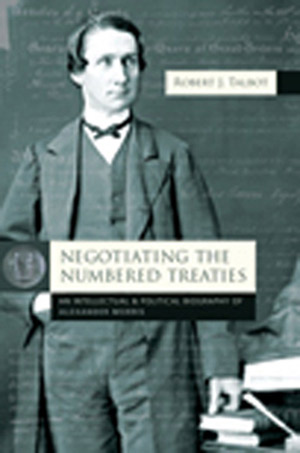Negotiating the Numbered Treaties:
An Intellectual and Political Biography
of Alexander Morris

Support Canada's History in other ways (more)
by Robert J. Talbot
Purich Publishing Ltd., Saskatoon, 2009
224 pp., illus., $27 paperback
A double review with The Indian Commissioners:Agents of the State and Indian Policy in Canada’s Prairie West, 1873–1932
by Brian Titley
University of Alberta Press, Edmonton, 2009, 266 pp., illus., $39.95 paperback
Don’t be fooled by the dull title. University of Lethbridge professor Brian Titley’s The Indian Commissioners fleshes out the personalities of the bureaucrats who were in charge during a cataclysmic period for Native peoples in Western Canada.
With the formerly vast buffalo herds gone — due to over-hunting by Europeans and the pressure to clear the prairies for farming — once proud and independent peoples suddenly found themselves wards of the state, reluctantly signing treaties and relying on meagre government handouts to avoid starvation.
The men sent west from Ottawa to deal with the tribes were a mixed lot. J.A.N. Provencher, the Manitoba Indian commissioner, was a hard-drinking, high-living bon vivant from Montreal who was drummed out of office for corruption and incompetence in 1878. Yet he expressed surprisingly enlightened views for his time. For instance, he thought Natives should keep their own languages.
David Laird became Indian superintendent for the Northwest in 1876. He was a dour, straight-laced Presbyterian from Prince Edward Island who took on the thankless task with grim fortitude. Laird did his best to make the former buffalo hunters into farmers, but Ottawa was slow and cheap when it came to supplying the livestock and implements promised in the treaties.
Another commissioner, English adventurer and sportsman Edgar Dewdney, is notable for having decided on “industrial schools” for Native children. These regimented, church-run schools, originally designed for wayward youth and criminals in England, became the system of choice for educating Aboriginal children well into the twentieth century.
Titley’s book offers engaging insight into the historical underpinnings of Aboriginal issues that resonate deeply today. If his overview fuels an interest in further reading on this topic, the place to turn might be Robert J. Talbot’s biography of Alexander Morris, the main Crown negotiator of the western treaties.
Morris has been a lightening rod for criticism of the way the treaties were made, but in Negotiating the Numbered Treaties Talbot takes a more sympathetic view of the man.
Talbot argues that the chiefs who signed the treaties did so as shrewd negotiators who were making the best of a difficult situation. He argues that they were not, as they have often been portrayed, ignorant of what they were doing.
— Nelle Oosterom (Read bio)
Nelle Oosterom is the Senior Editor of Canada's History magazine.